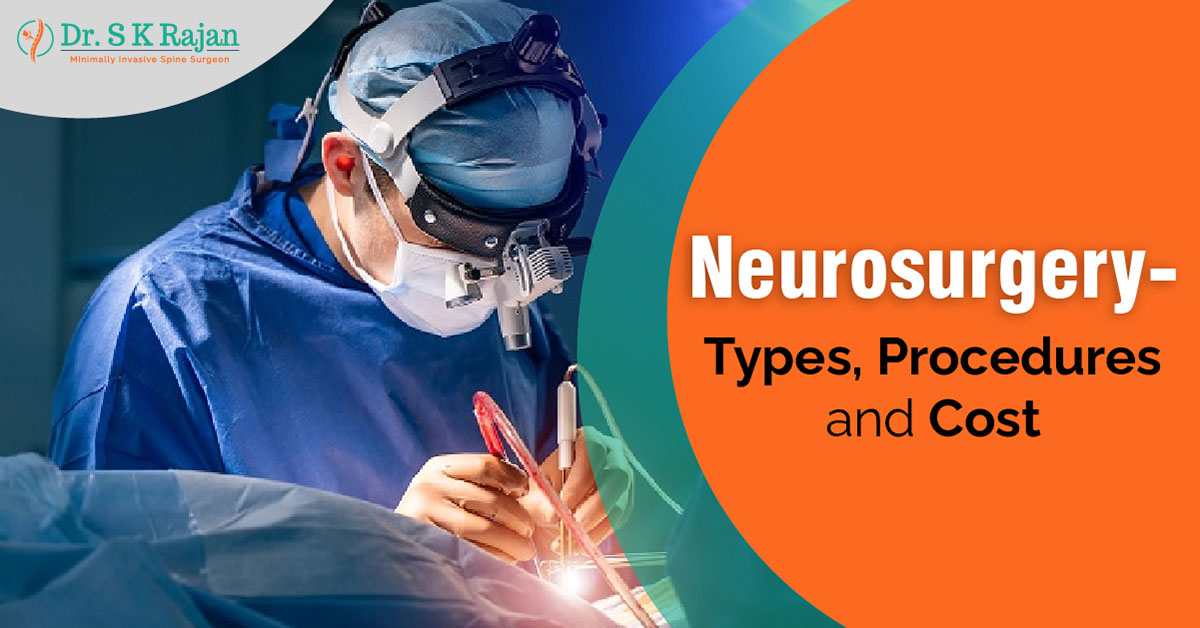Neurosurgery - Types, Procedures, and Cost

Neurosurgery is a specialized medical field that focuses on diagnosing, treating, and preventing disorders affecting the nervous system, including the brain, spinal cord, and peripheral nerves. Neurosurgeons are highly skilled physicians who perform intricate surgeries to address various conditions that can significantly impact a person's quality of life.
What is Neurosurgery?
Neurosurgery is a branch of medicine that deals with the surgical treatment of disorders affecting the nervous system. It involves using advanced surgical techniques and technologies to address conditions such as brain tumours, spinal cord injuries, cerebral aneurysms, epilepsy, Parkinson's disease, and many others. Neurosurgeons undergo extensive training, typically completing a medical degree and several years of specialized residency training.
Types of Neurosurgery:
- Brain SurgeryBrain surgery, also known as craniotomy, involves the surgical treatment of conditions affecting the brain. It can include procedures such as tumour removal, vascular abnormalities treatment, and managing traumatic brain injuries. Brain surgery requires precision and expertise due to the delicate nature of the brain.
- Spinal Surgery:Spinal surgery treats conditions affecting the spinal cord and the surrounding structures. Procedures may include:
-
- Discectomy (removal of herniated disc).
- Spinal fusion
- Decompression surgery.
- Correcting spinal deformities like scoliosis.
- Peripheral Nerve Surgery:Peripheral nerve surgery involves the treatment of conditions affecting the nerves outside the brain and spinal cord. This can include procedures to repair nerve injuries, remove nerve tumours, and alleviate nerve compression syndromes such as carpal tunnel syndrome. Peripheral nerve surgery aims to restore normal nerve function and alleviate pain or dysfunction.
Treatment & Prevention
Neurosurgery plays a crucial role in treating and preventing various neurological conditions. The field utilizes a multidisciplinary approach, collaborating with other specialties such as neurology, radiology, oncology, and rehabilitation medicine to provide comprehensive care.
Treatment options in neurosurgery include surgical intervention, medical management, radiation therapy, and rehabilitation. Treatment choice depends on the specific condition, its severity, and the patient's overall health. Neurosurgeons work closely with patients to develop personalized treatment plans that address their unique needs.
In terms of prevention, neurosurgery focuses on early detection and intervention. Regular check-ups, diagnostic imaging, and genetic testing can help identify potential neurological disorders before they progress. Lifestyle modifications, such as maintaining a healthy diet, exercising regularly, and managing chronic conditions like diabetes and hypertension, can also contribute to preventing some neurological conditions.
Neurosurgery Procedures:
Neurosurgery procedures can vary depending on the specific condition being treated. Some commonly performed procedures include:
- Brain Tumor Surgery: Brain tumour surgery involves the removal of abnormal growths within the brain. The procedure aims to safely remove as much of the tumour as possible while preserving brain function. Advanced techniques, such as intraoperative imaging and brain mapping, assist neurosurgeons in precisely locating and removing tumours.
- Deep Brain Stimulation:Deep brain stimulation (DBS) is a surgical procedure for treating movement disorders such as Parkinson's disease, essential tremor, and dystonia. It involves implanting a neurostimulator in the brain, which delivers electrical impulses to specific areas, helping to alleviate symptoms.
- Spinal Fusion: Spinal fusion is a procedure that involves joining two or more vertebrae in the spine to stabilize and immobilize them. It is often performed to treat spinal instability, spinal fractures, degenerative disc disease, and spinal deformities. During the procedure, bone grafts, metal rods, screws, or plates may be used to promote fusion and restore stability to the spine.
- Endovascular Coiling: Endovascular coiling is a minimally invasive procedure used to treat cerebral aneurysms. It involves navigating a catheter through the blood vessels to the aneurysm site and filling it with tiny platinum coils. This promotes blood clotting and prevents the aneurysm from rupturing or growing larger.
- Microvascular Decompression:Microvascular decompression is a surgical procedure for treating trigeminal neuralgia and hemifacial spasm. It involves identifying and relieving compression of cranial nerves by placing a small cushioning pad between the nerve and the blood vessel causing the compression. This procedure helps to alleviate pain and spasms associated with these conditions.
-
Cost of Neurosurgery in India:The cost of neurosurgery in India can vary
depending on the specific procedure, the complexity of the case, the hospital or clinic,
and the geographical location. Generally, neurosurgery procedures are complex and
require a highly skilled surgical team, advanced equipment, and postoperative care.
The cost of neurosurgery operations in India is relatively affordable compared to many other countries. For example, the cost of brain tumour surgery can range from 40,000 TO 60,000 INR, while the cost of spinal fusion surgery may vary from 50,000 to 1,00,000 RS. These estimates are approximate and can vary significantly depending on the factors mentioned earlier.
It is important to note that neurosurgery costs include pre-operative evaluations, postoperative care, medications, diagnostic tests, and hospitalization fees. Patients should consult with their neurosurgeon or the hospital to comprehensively understand the costs involved.
FAQ's
1.When is neurosurgery recommended?
Neurosurgery is recommended when non-surgical treatments have been ineffective or when a condition requires immediate surgical intervention, such as in cases of brain tumours, spinal cord injuries, or aneurysms.
2. How long does a neurosurgery operation typically last?
The duration of a neurosurgery operation can vary depending on the complexity of the condition and the specific procedure being performed. It can range from a few hours to several hours.
3. Is neurosurgery a risky procedure?
Like any surgical procedure, neurosurgery carries certain risks. However, neurosurgeons are highly trained professionals who take precautions to minimize risks and ensure patient safety.
4. What is the recovery process like after neurosurgery?
The recovery process after neurosurgery varies depending on the type of procedure performed, and it may involve a hospital stay, medication, rehabilitation, and follow-up appointments with the neurosurgeon.
5.Are there non-surgical alternatives to neurosurgery?
Sometimes, non-surgical treatments such as medications, physical therapy, or radiation therapy may be recommended before considering neurosurgery. The best approach depends on the specific condition and individual circumstances.
6. What are the common risks associated with neurosurgery?
Common risks associated with neurosurgery include infection, bleeding, damage to surrounding structures, adverse reactions to anesthesia, and potential neurological complications. Your surgeon will discuss these risks with you before the procedure.
7. Will I experience pain after neurosurgery?
Pain after neurosurgery is joint, but medications are usually prescribed to manage it. Your surgeon will provide instructions on pain management and follow-up care.
Dr. SK Rajan, a Best neurosurgeon in Gurgaon delivers expert care and cutting-edge treatments for neurological conditions with precision and compassion.


